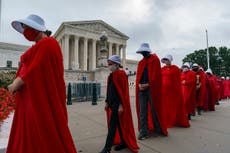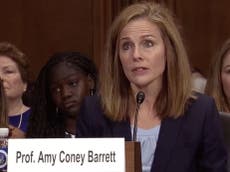Amy Coney Barrett hearing: Controversial Supreme Court pick makes opening pitch before the Senate
‘It was the content of Justice Scalia’s reasoning that shaped me,’ Barrett says of conservative icon and mentor
Your support helps us to tell the story
From reproductive rights to climate change to Big Tech, The Independent is on the ground when the story is developing. Whether it's investigating the financials of Elon Musk's pro-Trump PAC or producing our latest documentary, 'The A Word', which shines a light on the American women fighting for reproductive rights, we know how important it is to parse out the facts from the messaging.
At such a critical moment in US history, we need reporters on the ground. Your donation allows us to keep sending journalists to speak to both sides of the story.
The Independent is trusted by Americans across the entire political spectrum. And unlike many other quality news outlets, we choose not to lock Americans out of our reporting and analysis with paywalls. We believe quality journalism should be available to everyone, paid for by those who can afford it.
Your support makes all the difference.Supreme Court nominee Amy Coney Barrett made the case for her confirmation to the Supreme Court on Monday, just 22 days before the 2020 presidential election, promising to be an impartial juror who sticks to the confines of the law when deciding cases.
While Democrats have dismissed the hearings on Ms Barrett’s nomination to fill the void on the court left by the late Justice Ruth Bader Ginsburg as “illegitimate” amid an election where 6m Americans have already cast their votes, the federal circuit court judge said she was “honoured” to come before the chamber to state her case.
Ms Barrett likened her understanding of the law to the views of the late conservative bulwark Justice Antonin Scalia, for whom she clerked.
“Like many law students, I felt like I knew the justice before I ever met him, because I had read so many of his colourful, accessible opinions. More than the style of his writing, though, it was the content of Justice Scalia’s reasoning that shaped me,” she said.
“His judicial philosophy was straightforward: a judge must apply the law as written, not as the judge wishes it were. Sometimes that approach meant reaching results that he did not like. But as he put it in one of his best known opinions, that is what it means to say we have a government of laws, not of men.”
Ms Barrett established her viewpoint that the courts have “a vital responsibility to enforce the rule of law, which is critical to a free society.”
But, she added, “courts are not designed to solve every problem or right every wrong in our public life.
“The policy decisions and value judgments of government must be made by the political branches elected by and accountable to the people. The public should not expect courts to do so, and courts should not try,” she said.
Senate Democrats have argued Ms Barrett’s previous remarks about several Supreme Court decisions — both in the past and ones yet to come — do not comport with such statements.
Each of the Judiciary Committee’s 10 Democrats warned Americans that Ms Barrett’s confirmation would effectively serve to “dismantle” the 2010 health care overhaul known as Obamacare, fulfilling a promise by Mr Trump to do so by appointing conservative judges to the federal bench.
Ms Barrett has previously made several public comments pitting her against Obamacare’s “individual mandate” provision that penalises people on their taxes who do not have health insurance.
Senate Minority Leader Chuck Schumer on Sunday called on Ms Barrett to recuse herself from any Supreme Court decision regarding the 2010 health care law, saying her public record on the law is “filled with evidence demonstrating the need for recusal.”
Senate Democrats each highlighted cases of people in their states with pre-existing conditions who have benefited from Obamacare’s policies.
Connecticut Senator Richard Blumenthal told the story of a 10-year-old boy in his state who suffers from Duchenne muscular dystrophy, a chronic disease whose symptoms often include frequent falling, trouble getting up or running, a waddling gait, enlarged calves, and learning disabilities.
“The costs of providing Connor’s care are astronomical,” Blumenthal said.
But Obamacare has “shielded him and his family from arbitrary caps that would have cut off his care if it became too expensive,” the senator said.
“Connor and millions of others like him are why I will oppose your nomination. Your nomination is about the Republican goal of repealing the Affordable Care Act, the Obamacare they seem to detest so much,” he said.
Ms Barrett imparted a personal touch in her brief opening remarks, saying that while she has been devoted to her legal clients and her students as a professor at Notre Dame Law School, she has been determined not to let her job subsume her role as a wife, mother, and daughter.
“There is a tendency in our profession to treat the practice of law as all-consuming, while losing sight of everything else. But that makes for a shallow and unfulfilling life,” she said.
Mirroring the introductions of several Senate Republicans — most of whom began their opening remarks at the hearing on Monday by mentioning the judge’s seven children — Ms Barrett cast herself as a family woman reared in a devout Roman Catholic home in New Orleans that instilled lifelong family values in her.
Ms Barrett credited her husband, her children, and her parents and siblings, and her all-girls high school education with helping instill in her the idea that women can do anything.
“When I went to college, it never occurred to me that anyone would consider girls to be less capable than boys,” she said in her opening remarks.
While Ms Barrett made clear her legal philosophy mirrors the textualism espoused by Mr Scalia, Ms Ginsburg’s friend but intellectual rival, the judge acknowledged her predecessor for helping pave the way for women in the legal profession.
“I have been nominated to fill Justice Ginsburg’s seat, but no one will ever take her place. I will be forever grateful for the path she marked and the life she led,” Ms Barrett said.






Join our commenting forum
Join thought-provoking conversations, follow other Independent readers and see their replies
Comments